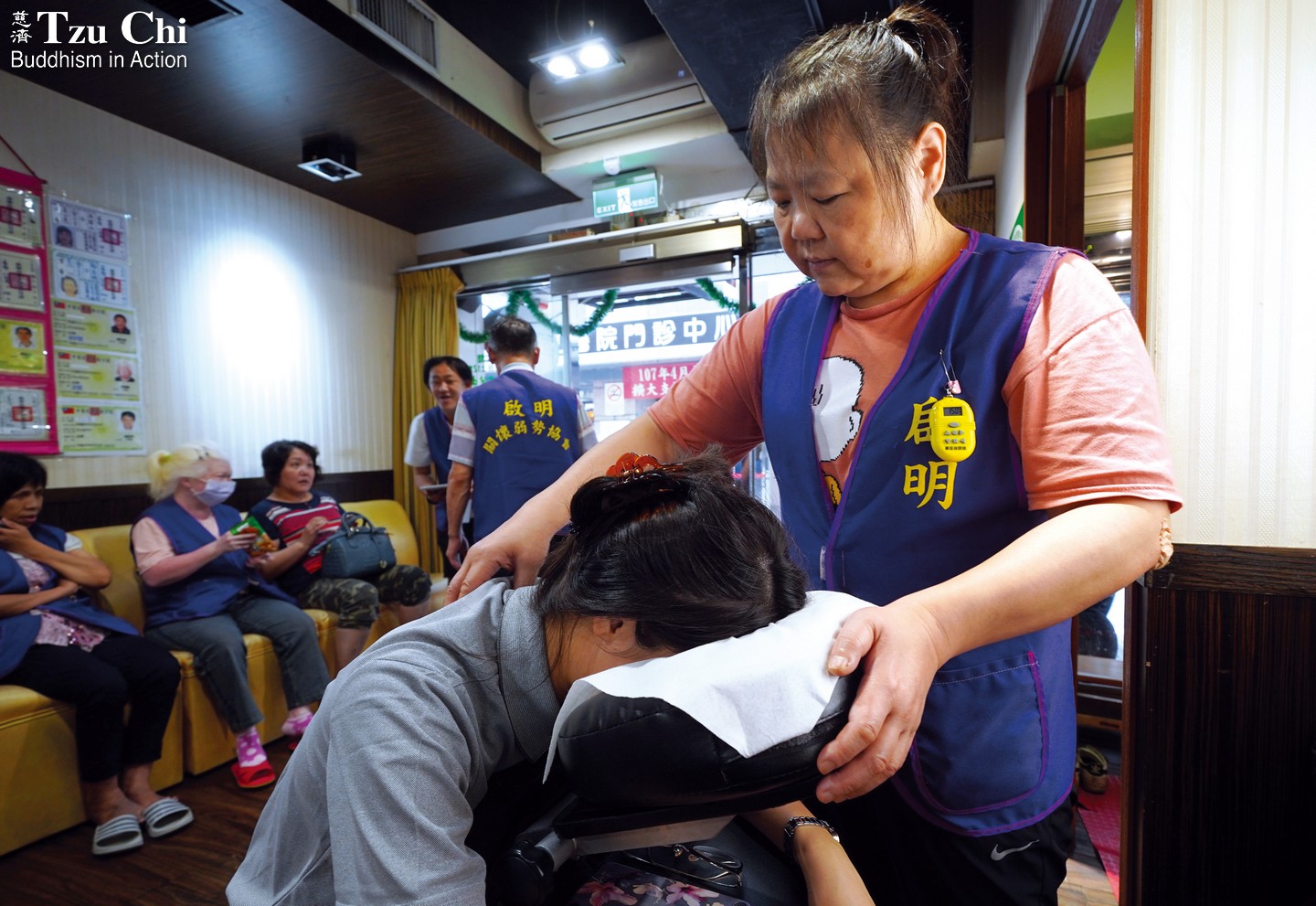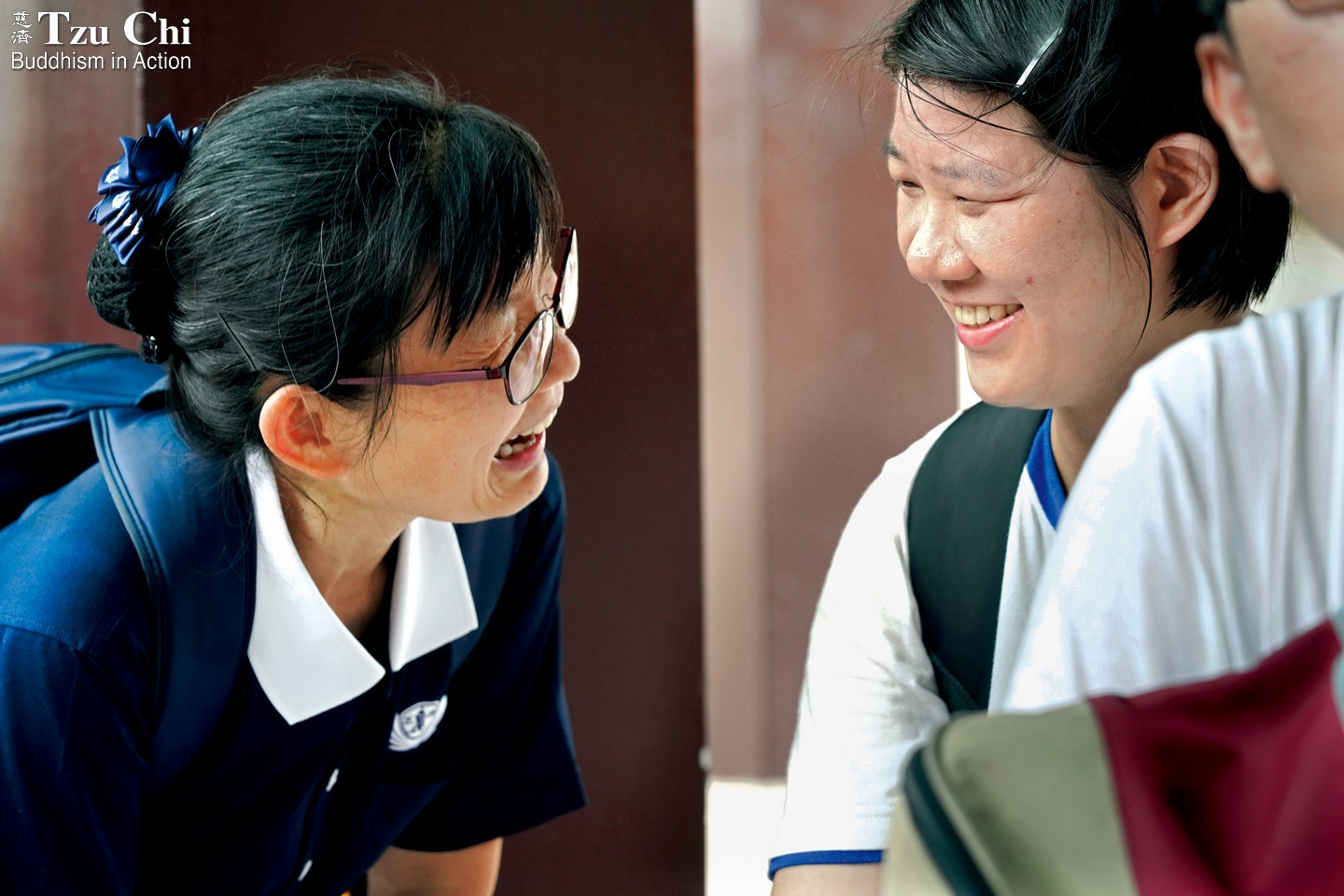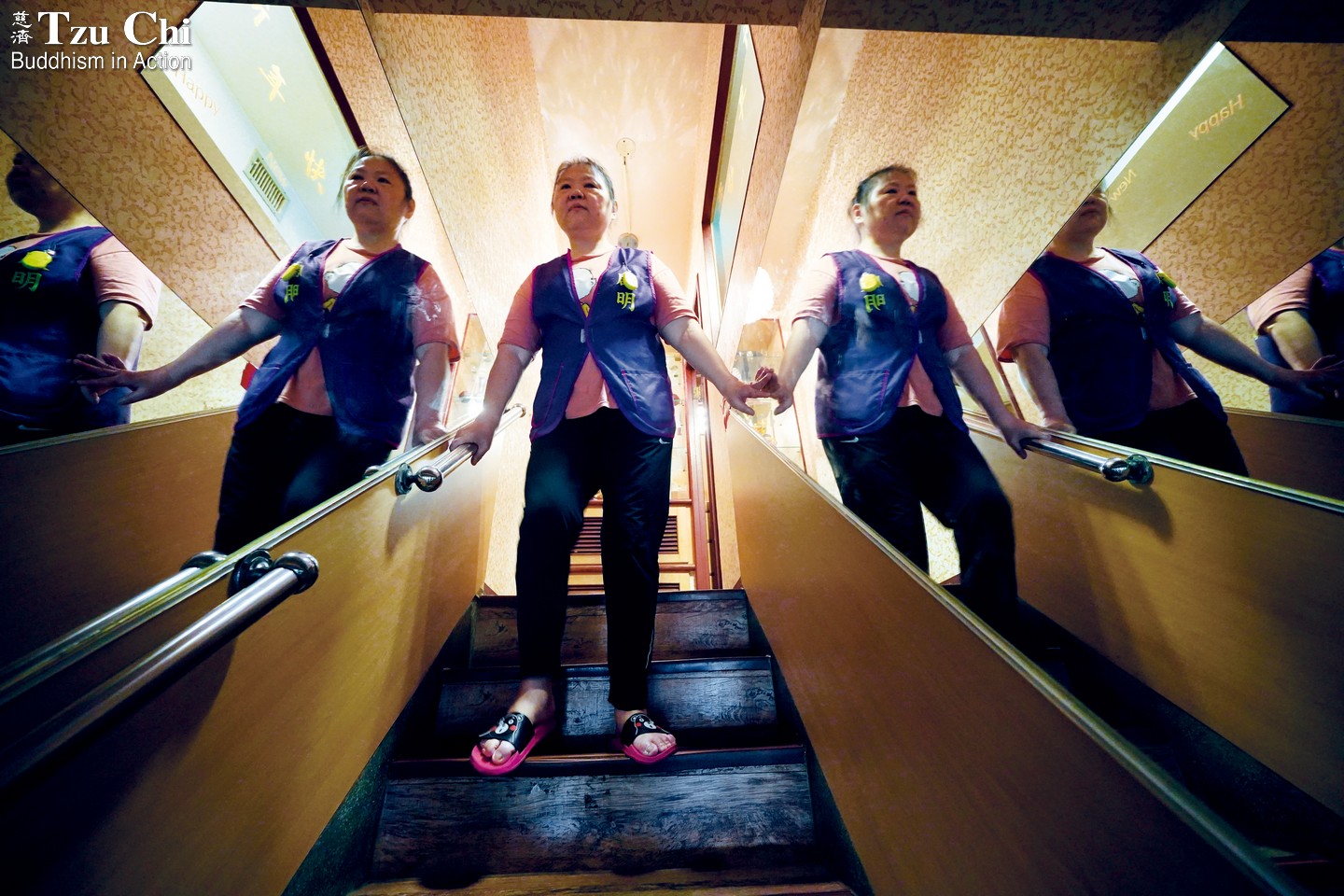By Zhan Yun-ying
Translated by Wu Hsiao-ting
Photos by Hsiao Yiu-hwa
I love to work. I’m so happy I’ve become a professional masseuse and can make a living now. When a customer says to me, “That felt really good,” I feel great too! —Que Wen-li

Que Wen-li massages a customer to help her relax her tense muscles.
Working slowly and methodically, Que Wen-li (闕文莉), 55, mindfully exerts pressure with her expert hands and works to relax her customer’s tense muscles. Feeling each one with her fingertips, she locates corresponding acupoints and presses and rubs them.
At first glance, there is nothing unusual about this masseuse. However, if you were to look closer, you’d notice a cloudiness in her left eye. That eye is completely blind. Her right eye is better, but not by much. She can only see blurry shapes in that one.
Que can still clearly remember the day she lost her vision. It happened so suddenly. Just the day before, she had gone to a local temple to watch a performance celebrating the Lantern Festival. Her eyes had been just fine. Who was to know that the next day she’d wake to find her vision terribly hazy? A visit to the hospital revealed the culprit: diabetes-induced retinal detachment. Overnight, her world changed forever.
Massage as a profession
Before her sudden loss of vision, Que had helped care for her mother-in-law, a stroke patient. After she went blind, it became impossible for her to continue her role as a caregiver. She couldn’t do chores around the house or go out to buy food. Her family, instead of being understanding of her condition, accused her of being lazy. They called her “a useless person.” It’s easy to see why they argued a lot during this period. “I thought constantly about ending my life during that time,” Que recalled. “I didn’t want to be a useless person.” She lost all her confidence, and isolated herself at home for the next ten years.
In 2016, she applied for a disability certification from the government, which led to a visit from social workers from the Institute for the Blind of Taiwan (IBT). The social workers encouraged her to step out of her home and to break free from her isolation. They told her that with training she would be able to do things independently again, such as taking a bus on her own. Que thought they were pulling her leg: “How is it possible for a blind person to take a bus on their own? That’s impossible!”
But the social workers were nothing if not persistent. They arranged for Que to begin receiving daily living skills training at the IBT southern center. As she relearned how to take care of herself, her faith in life was gradually reignited.
Though she was originally firmly against studying massage, Que desperately wanted to become economically independent again. “I wanted my dignity back,” she said. “I didn’t want to depend on my family for money anymore.” She knew the only way she was going to make any money was to learn a trade, so she resolutely decided to leave her hometown in Kaohsiung, southern Taiwan, for the IBT campus in northern Taiwan to learn massage skills. Under the guidance and help of IBT teachers, psychological counselors, and other visually impaired people, her attitude towards the massage profession gradually began to warm.
Due to limited funding, there is a yearly limit on the number of people admitted to the massage program at the IBT. People who wish to enter the program must pass a written exam and interview. “I went all out during the interview,” Que declared. “I was determined to garner a spot on the program.” Her efforts paid off, and she was admitted to the program.
However, learning massage wasn’t as easy as she had expected. The entire course lasted nine months, and every participant had to undergo 1,600 hours of intensive training. There was a lot to learn: basic anatomy, pathology, the study of the meridian system, not to mention the massage techniques themselves. The biggest challenge came from having to master the knowledge of muscle structures, acupuncture points, and the meridian system. Que, already in her 50s, often had difficulty remembering things. She felt so frustrated she even second-guessed her decision to join the program. “What was I thinking, to leave a life I was familiar with to come here to suffer?” she’d ask herself.
Fortunately, the teachers at the IBT understood what their students were going through, and they shared their own experiences to help the students through those difficult times. With the instructors’ help and encouragement, Que forged on. “Everyone goes through the same thing I’m going through,” she said to herself. “It’s not just me.” She graduated from the IBT in 2018, and with a recommendation from the institute, she began working at a massage parlor in Keelung, northern Taiwan.
“When I first started working, my hands were often so sore I’d cry at night,” Que recalled. But she tried to see this time as a transitional period. She comforted herself that she felt sore because she had worked hard. Her customers were sometimes a source of frustration too. “One time a customer told me I had done a poor job of massaging.” That comment greatly disheartened her. Her colleagues consoled her and encouraged her to turn her feeling of frustration into a motivating force for improvement, to make up for her lack of experience with a willingness to learn and get better.
Que took their advice to heart. She also began to realize the necessity to improve. She and her classmates had received a solid grounding in massage skills at the IBT, but what they had learned was not enough for them to serve the rich array of customers they would encounter in their businesses. Some of their customers might, for example, suffer from deformed spines due to poor postures, giving rise to the need to handle them differently. Therefore, Que resolved never to stop learning and improving her skills, and she was quick to consult with her fellow massage therapists if she needed help.

People who are born with sight but lose their vision later in life need help and support as they find a way through their darkness.
Paying back society
At one time, Taiwan’s massage industry was the exclusive province of the visually impaired—only non-sighted people could legally practice massage in Taiwan. But in 2008, Taiwan’s Council of Grand Justices issued a constitutional interpretation declaring that law unconstitutional. The law was removed from the books three years later. As a result, the massage industry was opened up to the sighted population on October 31, 2011.
Wu Hong-ming (吳弘銘) is a graduate of the IBT who has worked as a masseur for a decade. He commented about lifting the legal barrier for the sighted to enter the massage industry: “Massage parlors run by the visually impaired are usually not as luxurious or fancy as those run by the sighted. The impact on us [from the competition] was inevitable.” Que, having worked as a masseuse for just over a year, learned from her boss that business was indeed a lot worse than it used to be before sighted massage therapists were allowed. Que isn’t too worried though. She said, “What you need to do is improve your skills. You needn’t worry [about the competition from sighted massage therapists] as long as you have superior massage skills.”
She believes that when God closes one door, he opens another. She mentioned that her sense of touch has become sharper since her sight was taken from her. And having a good sense of touch is critical in massage work, because it relies mostly on the sense of touch. Since everyone has different body shape, it isn’t necessarily more accurate to locate an acupoint by sight. “While sighted people can easily locate the meridian system by sight, we visually impaired have to grope and feel for what we’re looking for,” Que remarked. “It might take us more time, but once we locate what we’re looking for, we can render more spot-on services.” It is also easier for the sightless to concentrate and focus on what they are doing.
When Que was a student at the IBT, Tzu Chi volunteers invited many physically disabled people to the institute to share with the students how they had overcome their challenges in life. Volunteers also encouraged IBT students to donate what money they could on a regular basis to pay back society. Doing so helped them build their confidence too. “I found it amazing,” said Que, “that we visually impaired could help others too.”
Before she lost her sight, Que ran a vegetarian restaurant. A Tzu Chi volunteer happened to live next door to the restaurant, and at her invitation, Que began making a monthly donation of a hundred NT dollars (US$3.31) to the foundation. But after she lost her sight, she lost the ability to work and had to stop donating to the charity. As soon as she rejoined the job market in January 2019, she started donating again. She expressed her happiness at being able to make money and help others again.
Wang Guo-hao graduated from the IBT the same year as Que. He also shared the joy of giving. He remembered that when he was still a student at the IBT, the institute arranged for students to give massage services to people in a vegetative state. Since people in that state are unresponsive and Wang and his fellow classmates couldn’t see, they were afraid of hurting those they were massaging. Even so, they found the experience emotionally stirring. “Many of us cried,” Wang said. “We were all deeply moved. We had no idea we could help others like that.”
Wang now works at a massage parlor established by the IBT. The parlor donates part of its revenue back to the institute. It’s one way for graduates to pay back. Everyone hopes that through this cycle of goodness, more unsighted people can be helped.
Que once held the misconception that massage was just a front for the sex industry, but she knows better now. She respects her own profession as a massage therapist. She talks about the sense of accomplishment she receives at work: “When a customer I’ve just served tells me, ‘That felt really good,’ I feel great too.”
Now that she has become economically independent again, her family has changed their attitude toward her. She feels very lucky to have encountered the IBT. The institute allowed her to rediscover her dignity, and she is very grateful.
Que once heard a Tzu Chi volunteer with a disability say, “You’re on the way to success the moment you step out of your home.” Those words made a deep impression on her. Thinking back on those words now, she realizes that she and other visually impaired people like her are examples of such a success story. Through perseverance, courage, and with some help, people who have lost their sight can regain their ability to work, pay back society, and rediscover life’s meaning. They can emerge triumphant from their valley of darkness.
After training, and with the help of barrier-free facilities, visually impaired people can move around safely in familiar environments just as easily as sighted people.




